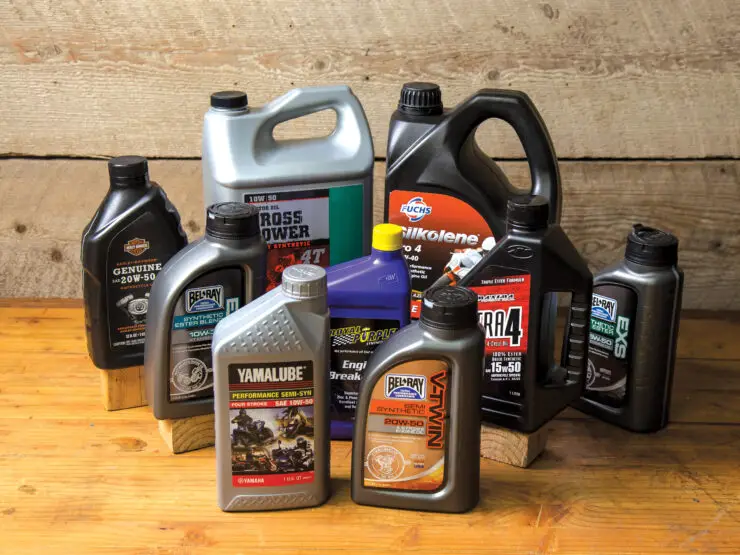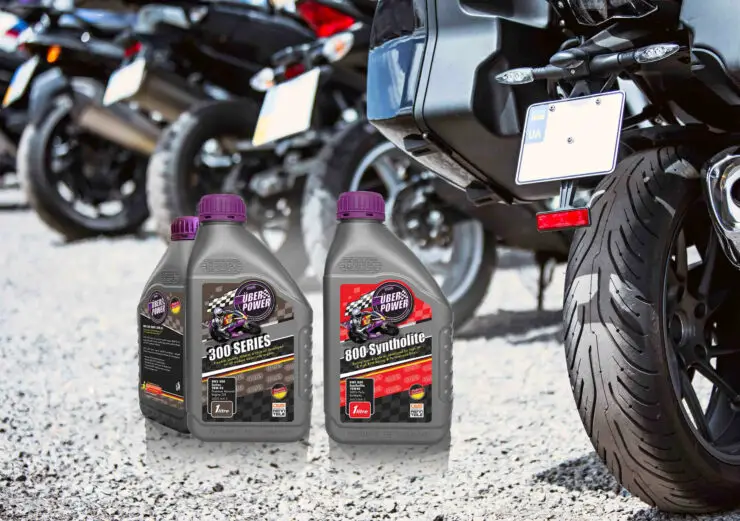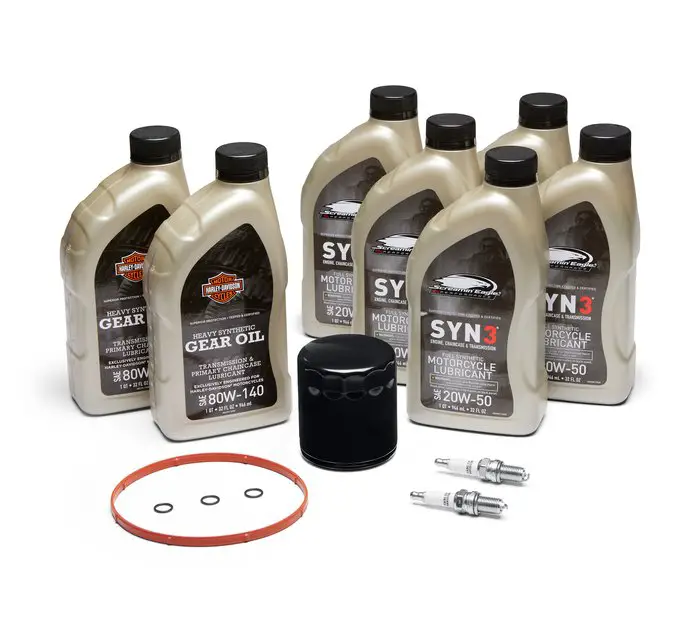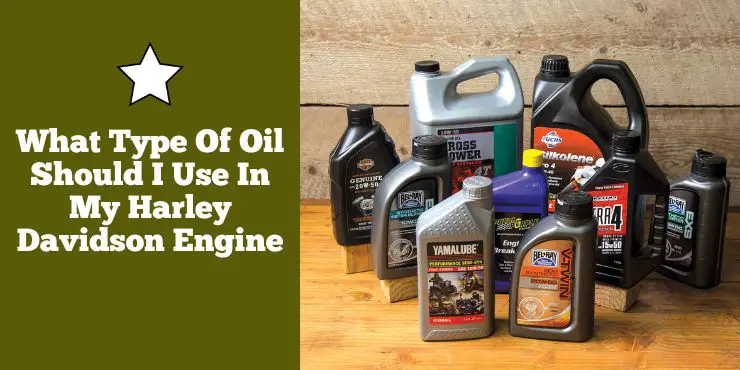Are you wondering what type of oil you should be using in your Harley-Davidson engine? You’re not alone! With so many different types of oils on the market, it can be hard to know which one is best for your bike.
Use high-quality, motorcycle-specific oil like Harley-Davidson Syn3 20W-50 or Mobil 1 V-Twin 20W-50, which provide heat resistance and lubrication for V-twin engines.
Fortunately, this article will help you make the right decision for your Harley-Davidson. We’ll take a look at the different types of oil and their benefits, as well as any potential drawbacks. So, if you’re ready to learn which oil is best for your Harley-Davidson engine, read on!
What type of oil should I use in my Harley-Davidson engine?
For a while, Harley-Davidson bikers used to have Twin-Cam engines. These engines have now been changed to V-twin-cam engines. As the engines in Harley-Davidson bikes have evolved, most bikers have a common question – what type of oil should I use in my Harley-Davidson engine?
>>> Click here to read our review of the Best Oil For Harley-Davidson <<<
The type of oil that is often recommended for Harley-Davidson bikes is the AMSOIL full synthetic 20W-50 oil. Harley-Davidson recommends that riders use SAE 20W-50 or the Mobil 1 20W-50 V-twin synthetic motorcycle motor oil. These options are perfect as they are full synthetic oil options that lubricate the engine properly. However, this doesn’t necessarily mean that there aren’t any other oil options that you can use on your bike. Moreover, you cannot just pour any oil into your bike’s engine.
If you’re not able to able to acquire the recommended motorcycle engine oils, there are substitute options that have the same qualities. It will help you understand that your Harley has a powerful V-twin engine and requires oil that properly combusts. The oil should be good enough to maintain the lifespan of your motorcycle. Here are some of the substitute oil options that you can use for your Harley-Davidson motorcycle –
- Bel-Ray V-twin primary chain case lubricant
- Red Line V-twin primary engine oil
- Maxima Racing Oils V-twin mineral engine oil

Different types of oil for Harley-Davidson engines
If you’re a Harley-Davidson motorcycle owner, you will be well aware that isn’t just a machine. Your Harley-Davidson motorcycle is a symbol of power, freedom, and the open road. To keep your powerful ride running at its best, choosing the right type of oil will be of paramount importance. Harley-Davidson engines demand proper lubrication and protection because of their high-performance nature. Here are some of the different types of oil for Harley-Davidson engines.
Mineral oil
Mineral oil or also known as conventional or natural oil is derived from crude oil through a refining process. Mineral oil is the most traditional type of oil and has been used in engines for decades. Composed of hydrocarbon molecules, mineral oil offers a basic level of lubrication for the engine’s moving parts. However, there are some limitations when used in high-performance engines like the ones in Harley-Davidson bikes.
Mineral oil is typically less expensive than synthetic or semi-synthetic oils. It can be a great option for older Harley-Davidson models that might not require the advanced protection of synthetic oils.
Due to its basic nature, mineral oil might struggle to withstand extreme temperatures and high-stress conditions, which are common in Harley-Davidson engines. Moreover, this type of oil tends to break down faster, necessitating more frequent oil changes compared to synthetic alternatives.
Synthetic oil
Synthetic oil is a lab-engineered product designed for offering superior performance and protection. It is created through a complex process that involves synthesizing molecules for achieving specific properties. Synthetic oils are highly refined, resulting in a more consistent and pure composition compared to mineral oil.
Synthetic oils have excellent viscosity stability, which means that they maintain their protection qualities even under extreme temperatures and stress. The uniform molecular structure of synthetic oil reduces friction, resulting in less wear and tear on engine components. Synthetic oils typically last longer, allowing for extended oil change intervals.
It is worth noting that synthetic oils are much more expensive than mineral oil but the added benefits might outweigh the cost for high-performance engines like those in Harley-Davidson bikes.
Semi-synthetic oil
As the name suggests, semi-synthetic oil is essentially a blend of mineral and synthetic oils. This combination aims to offer a balance between the affordability of mineral oil and the performance benefits of synthetic oil.
Semi-synthetic oil offers better protection than pure mineral oil and can easily handle higher temperatures and stress. While they’re less expensive than fully synthetic oil, they still come at a higher cost than mineral oil.
Choosing the appropriate type of oil for your Harley-Davidson engine will require careful consideration of factors like the model year, riding conditions, and personal preferences. For newer Harley-Davidson models and riders who value top-notch performance and engine protection, fully synthetic oil is often the preferred choice. However, for older motorcycles or those with less demanding usage, semi-synthetic or mineral oil might suffice.
Regardless of the type of oil you’re going for, you must follow Harley-Davidson’s recommended viscosity and change interval to ensure the engine performs optimally and delivers the unrivaled riding experience that defines the spirit of the open road. Regular maintenance and timely oil changes will keep your Harley running strong and allow you to enjoy countless miles on your bike.
Pros and cons of mineral oil for Harley-Davidson engine
When it comes to choosing the right type of oil for a Harley-Davidson bike, there are numerous options available, with each one coming with its own set of advantages and disadvantages. Among these options is mineral oil or also known as conventional oil. Mineral oil is essentially derived from crude oil through a refining process and has been used in Harley-Davidson engines for many years.
Here are some of the advantages of using mineral oil in a Harley-Davidson engine –
#1. Cost-effectiveness
One of the biggest advantages of mineral oil is its affordability. Compared to synthetic oils, mineral oil is typically much cheaper, which makes it an attractive option for Harley-Davidson owners on a budget. If you’ve got an older or less demanding Harley-Davidson model that doesn’t require the advanced protection of synthetic oils, mineral oil can provide a cost-effective solution for engine lubrication.
#2. Compatibility with older engines
Mineral oil is well-suited for older engines that might not have the same tolerance for synthetic oils. Older Harley-Davidson models may have different gasket materials and seals that are better compatible with mineral oil, making it a practical choice for such bikes.
#3. Basic lubrication
Mineral oil offers a basic level of lubrication for the engine’s moving parts. It forms a protective film on surfaces, reducing friction and preventing direct metal-to-metal contact. While not as high-performing as synthetic oils, it can still offer adequate lubrication for less demanding riding conditions.
Here are some of the disadvantages of using mineral oil in a Harley-Davidson engine –
#1. Limited performance under extreme conditions
One of the major disadvantages of mineral oil is its limited performance under extreme temperatures and high-stress conditions. Harley-Davidson engines are known for their high performance and power, and they can generate significant heat during operation. In such conditions, mineral oil might struggle to maintain its viscosity, which can lead to decreased engine protection and increased wear on critical components.
#2. Reduced engine efficiency
Due to its basic nature, mineral oil might not be as efficient in minimizing friction and internal losses within the engine. This reduced efficiency can potentially result in lower fuel economy and overall engine performance compared to synthetic oils, which are designed for optimizing engine operation.
#3. Frequent oil changes
Mineral oil tends to break down quicker than synthetic oils, especially under demanding riding conditions. As a result, Harley-Davidson riders using mineral oil might need to change their oil more frequently to ensure proper engine protection and performance. It can lead to increased maintenance costs and more frequent trips to the mechanic for oil changes.

Pros and cons of synthetic oil for Harley-Davidson engine
Synthetic oil is another amazing option that you can use for your Harley-Davidson bike. Synthetic oil has gained popularity thanks to its advanced properties and superior performance. Engineered in laboratories, synthetic oils are designed to provide optimal lubrication and protection under demanding conditions. To know more about synthetic oil and if you should use it in your Harley-Davidson bike’s engine, you should know about its pros and cons.
Here are some of the advantages of using synthetic oil in a Harley-Davidson engine –
#1. Superior engine protection
One of the biggest advantages of synthetic oil is its exceptional engine protection capabilities. The uniform molecular structure of synthetic oil reduces the friction between moving parts, minimizing wear and tear on critical engine components. This protection is especially important for high-performance Harley-Davidson engines, which endure higher stress levels during aggressive riding and extended journeys.
#2. Enhanced viscosity stability
Synthetic oil maintains its viscosity stability better than conventional mineral oil. It remains stable at both low and high temperatures, ensuring consistent lubrication and protection throughout a wide range of riding conditions. This stability is especially valuable for Harley-Davidson bikers who frequently encounter varying climates and terrains.
#3. Improved fuel efficiency
The reduced internal friction and improved lubrication properties of synthetic oil contribute to improved fuel efficiency. A smoother-running engine translates to optimized performance and increased mileage, which allows you to cover more miles with each tank of gas.
#4. Extended time between oil changes
Synthetic oil typically lasts longer than mineral oil, allowing extended oil change intervals. Harley-Davidson riders using synthetic oil can often go for more miles or time between oil changes, reducing maintenance frequency and costs in the long run.
#5. Cold-weather performance
Harley-Davidson riders in colder climates will definitely appreciate synthetic oil’s ability to flow more easily at low temperatures. This characteristic ensures quicker oil circulation during cold starts, reducing engine wear and improving overall performance during winter rides.
Here are some of the disadvantages of using synthetic oil in a Harley-Davidson engine –
#1. Higher cost
One of the major drawbacks of synthetic oil is its higher cost compared to conventional mineral oil. The advanced manufacturing process and superior properties of synthetic oil contribute to its premium price tag. However, many Harley-Davidson riders find that the benefits greatly outweigh the cost in terms of improved engine performance and longevity.
#2. Potential seal swelling
In some situations, synthetic oils might cause certain gasket materials and seals to swell or degrade. While the issue is rare and has reduced over time with improved formulations, it is important to make sure that the synthetic oil you choose is compatible with your specific Harley-Davidson model.
#3. Oil consumption
Synthetic oils having a lower viscosity might lead to slightly higher oil consumption, especially in high-mileage engines or those with pre-existing seal issues. Regularly monitoring the oil level and topping it up as required is important for maintaining proper engine lubrication.
Pros and cons of semi-synthetic oil for Harley-Davidson engine
When choosing the ideal engine oil option for your Harley-Davidson bike, another type of oil that you can go for is semi-synthetic oil. Semi-synthetic oil is also known as a blend or a hybrid oil. As the name suggests, semi-synthetic oil is essentially a mixture of mineral oil and synthetic oil, aiming to offer a balance between performance and affordability.
Here are some of the advantages of using semi-synthetic oil in a Harley-Davidson engine –
#1. Enhanced engine protection
Semi-synthetic oil offers improved engine protection compared to conventional mineral oil. The addition of synthetic components enhances the lubrication properties, which results in reduced friction and less wear on critical engine components. This advantage is especially valuable for high-performance Harley-Davidson engines subjected to demanding riding conditions.
#2. Better viscosity stability
Like fully synthetic oil, semi-synthetic oil exhibits improved viscosity stability across a wide range of temperatures. Semi-synthetic oil is able to maintain its viscosity better than conventional mineral oil, ensuring consistent engine lubrication and protection in varying climates and riding conditions.
#3. Balanced cost-effectiveness
Semi-synthetic oil strikes the perfect balance between the cost-effectiveness of mineral oil and the performance benefits of synthetic oil. While it might be slightly more expensive than conventional oil, it remains much more affordable than fully synthetic alternatives. It makes them an attractive choice for Harley-Davidson riders seeking improved performance without incurring the higher cost of fully synthetic oil.
#4. Extended oil change intervals
The synthetic components in semi-synthetic oil contribute to its ability to last longer than mineral oil. As a result, Harley-Davidson riders using semi-synthetic oil can greatly enjoy extended oil change intervals, reducing the frequency of maintenance and associated costs.
#5. Cold-weather performance
Semi-synthetic oil retains most of the benefits of synthetic oil, including improved cold-weather performance. During colder temperatures, semi-synthetic oil flows much more easily than conventional oil, ensuring faster oil circulation during start-ups and minimizing engine wear in chilly conditions.
Here are some of the disadvantages of using semi-synthetic oil in a Harley-Davidson engine –
#1. Less performance compared to synthetic oil
When semi-synthetic oil offers improved performance over mineral oil, it might not match the advanced engine protection provided by fully synthetic oil. Harley-Davidson engines operating under extreme conditions, such as high temperatures and aggressive riding might still benefit more from using fully synthetic oil.
#2. Potential oil consumption
Like fully synthetic oil, semi-synthetic oil’s lower viscosity might lead to slightly increased oil consumption, especially in high-mileage engines or those with pre-existing seal issues. Regularly monitoring the oil level and topping it up as needed will be important for maintaining proper engine lubrication.
#3. Not ideal for Harley-Davidson models
As with any oil type, compatibility will be important. As with any oil type, compatibility will be essential. Some Harley-Davidson motorcycles might not be suitable for semi-synthetic oil due to specific gasket materials or seal concerns. You must consult the manufacturer’s recommendations and ensure that semi-synthetic oil is compatible with your bike’s engine.

Factors to consider when choosing the best oil for a Harley-Davidson engine
If you’re in the market for engine oil for your Harley-Davison bike, you’ll need to know what type of oil should I use in my Harley-Davidson engine. Taking care of the engine will help you keep your bike in top-notch condition. To choose the best oil, there are different factors that you need to consider as selecting the right oil for your Harley-Davidson engine is paramount. The engine’s performance, longevity, and overall health will depend on the quality of the oil you’re using. With so many different options available, it is important to consider different factors to make a smarter decision. Here are the different factors to consider when choosing the best oil for a Harley-Davidson engine –
#1. Oil type
Harley-Davidson engines can greatly benefit from different types of oil, including mineral, synthetic, and semi-synthetic. Each type of oil comes with its advantages and disadvantages. Synthetic oils offer superior performance and engine protection but come at a relatively higher cost. Meanwhile, mineral oils are much more affordable but might not perform as well under extreme conditions. Semi-synthetic oil strikes the right balance between the two. You must choose an oil type that aligns with your bike’s needs , your riding habits, and your budget.
#2. Oil viscosity
Viscosity refers to the engine oil’s thickness or its resistance to flow at different temperatures. Harley-Davidson engines operate under various temperature conditions, from cold starts to high-temperature riding environments.
The correct viscosity ratings ensure proper engine lubrication and protection. Consider the climate in which you primarily ride and choose an oil viscosity that matches the manufacturer’s recommendations.
#3. Engine age and condition
Consider the age and overall condition of your Harley-Davidson engine. Older engines might require different oil characteristics than newer models. High-mileage engines could benefit from oils with added additives for extra protection. You should be mindful of any specific requirements or limitations related to the engine’s age and condition when choosing the oil.
#4. Riding conditions
Your riding habits and conditions play a key role in selecting the best oil for your Harley-Davidson engine. If you frequently engage in long-distance rides or aggressive riding, you should consider oils with superior performance and higher temperature resistance. Meanwhile, if you mainly use your bike for short rides in mild weather, a less expensive and conventional oil might suffice.
#5. Seal and gasket compatibility
Some oils, especially synthetic ones, might interact differently with certain gasket materials and seals. You should make sure that the oil you’re choosing is compatible with your Harley-Davidson bike’s gasket materials to prevent any potential issues with seal swelling or degradation.
#6. Budget and cost
While it is important to prioritize engine protection and performance, you should consider your budget when selecting the best oil for your Harley-Davidson bike. Synthetic oils might be more expensive but they offer impressive benefits for high-performance engines. If budget constraints are a concern, mineral oil or semi-synthetic oil can still offer adequate protection for less demanding riding conditions.
FAQ
What type of oil should I use in my Harley-Davidson engine?
Harley-Davidson recommends using SAE 20W-50 engine oil for most of their engines. This is a mineral-based oil that is specifically designed for high-performance engines and is recommended for use in Harley-Davidson engines.
What other types of oil can I use in my Harley-Davidson engine?
Synthetic oils can also be used in Harley-Davidson engines, and may be beneficial for certain models. These oils are designed to improve performance and provide better protection for engine parts. However, Harley-Davidson recommends using SAE 20W-50 engine oil in most models.
What other maintenance should I perform on my Harley-Davidson engine?
In addition to regular oil changes, it’s important to perform other maintenance on your Harley-Davidson engine to ensure it runs smoothly. This includes checking the air filter, spark plugs, and oil filter, as well as inspecting the battery and other engine components. It’s also a good idea to have your Harley-Davidson engine serviced regularly to maintain its performance and longevity.
>>> Read more about Oil for Harley-Davidson <<<


I’m operating my 1999 Road King Classic (EFI) with 32,000 miles on it, and it has a stage one increase. I have a Dynojet fuelpak w/ Vance and Hinea mufflers w/out true duals yet. An Arlen Ness Stage `1 Big Sucker, and I use 93 octane. (Best I can find). I was recently told by an HD employee in the parts department that I should use a Bonded oil because this would help control any oil leakage that I might run into later on.
Can you give me any advice about the Bonded oil?
Hi Brad, thanks for your comment!
On your ’99 Road King, you don’t really need a “bonded oil.” What dealers usually mean are oils with additives that slightly swell seals to reduce minor leaks — but unless you already have seepage, a good 20W-50 V-Twin motorcycle oil is the better long-term choice.
Popular options many riders use:
– Harley-Davidson Syn3 20W-50
– Mobil 1 V-Twin 20W-50
– Amsoil V-Twin 20W-50
Stick to regular oil changes (every 3–4k miles), and you’ll be fine. If leaks show up later, you could experiment with a seal-conditioning oil, but for now, quality synthetic V-Twin oil is the way to go.
Ride safe!